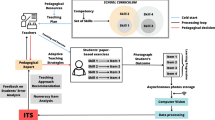Abstract
Traditional forms of educational instruction have witnessed a sharp inclination towards the use of educational technology and various e-learning tools and platforms. Educational technology is seen as a facilitator for learning, it motivates students and tends to increase their confidence. Up to the present day, the majority of the available research on this subject has been dominated by a Western perspective, while the needs and expectations of Arabic speaking students in context to educational technology has been ignored in the past. The focus of our on-going research is to understand the potential needs, requirements and expectations of the Saudi students (including college level, undergraduate, graduate and postgraduate students) in regards to educational interfaces and technology. In this work in progress paper, we have presented our on-going research by discussing its motivation, the methodology (including detailed information on the underlying questions characterising the research), methods and study participants, and finally research process practiced in the on-going research is presented.
Chapter PDF
Similar content being viewed by others
References
Albirini, A.: The Crisis in Educational Technology, and the Prospect of Reinventing Education. Educational Technology & Society 10(1), 227–236 (2007)
Timmermann, P.: Is my iPad in my backpack? Journal of Digital Research & Publishing, University of Sydney
Churchill, D., Fox, B., King, M.: Study of Affordances of iPads and Teachers’ Private Theories. Int. J. of Information and Education Technology 2(3) (June 2012)
Culén, C.A.L., Gasparini, A.: iPad: a new classroom technology? A report from two pilot studies. In: INFuture Proceedings, 2011, pp. 199–208 (2011)
Dunlap, J.C., Lowenthal, P.R.: Tweeting the night away: Using Twitter to enhance social presence. Journal of Information Systems Education 20(2) (2009)
Al-Wabil, A., Dhir, A., Al-Musaaed, H., Al-Sheaha, A.: Screening Program for Learning Difficulties in Arabic Speaking Students: Design Considerations for Educational Interfaces. In: Workshop on Interaction Design in Educational Environments (IDEE) 15th International Conference on Enterprise Information Systems (ICEIS), June 28 (2012)
Dhir, A., Alsumait, A.: Examining Educational User Interface, Technology and Pedagogy for Arabic Speaking Children in Kuwait, J. of Universal Computer Science (JUCS) special issue Interaction Design in Educational Environments (2013) (currently in press)
Roto, V., Rantavuo, H., Väänänen-Vainio-Mattila, K.: Evaluating User Experience of Early Product Concepts. In: Proceedings of International Conference on Designing Pleasurable Products and Interfaces, DPPI 2009, Compiegne (October 2009)
Heikkinen, J., Olsson, T., Väänänen-Vainio-Mattila, K.: Expectations for User Experience in Haptic Communication with Mobile Devices. In: Proc. Of MobileHCI 2009, Bonn, Germany, September 15-18. ACM Press (2009)
Plowman, L., Stephen, C.: Children, play, and computers in pre-school education. British Journal of Educational Technology 36(2), 145–157 (2005)
Chester, A., Gwynne, G.: Online teaching: encouraging collaboration through anonymity. Journal of Computer Mediated Communication 4, 2 (1998), http://jcmc.indiana.edu/vol4/issue2/chester.html
Earle, R.S.: The integration of instructional technology into public education: Promises and challenges. Educational Technology 42(1), 5–13
Jick, T.D.: Mixing qualitative and quantitative methods: Triangulation in action. Administrative Science Quarterly, 24 (4), pp. 602-611 (December 1979); Qualitative Methodology
Author information
Authors and Affiliations
Editor information
Editors and Affiliations
Rights and permissions
Copyright information
© 2013 Springer-Verlag Berlin Heidelberg
About this paper
Cite this paper
Boreqqah, A.A., Dhir, A., Buragga, K. (2013). Designing Educational Interfaces for Saudi Students. In: Stephanidis, C. (eds) HCI International 2013 - Posters’ Extended Abstracts. HCI 2013. Communications in Computer and Information Science, vol 374. Springer, Berlin, Heidelberg. https://doi.org/10.1007/978-3-642-39476-8_3
Download citation
DOI: https://doi.org/10.1007/978-3-642-39476-8_3
Publisher Name: Springer, Berlin, Heidelberg
Print ISBN: 978-3-642-39475-1
Online ISBN: 978-3-642-39476-8
eBook Packages: Computer ScienceComputer Science (R0)




